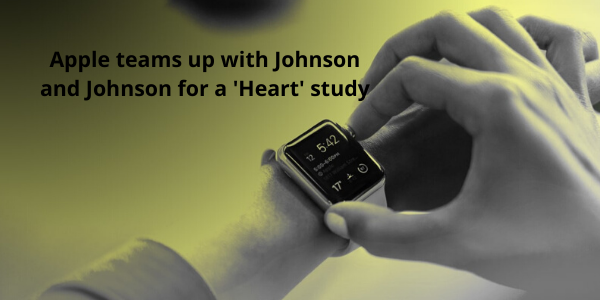
Apple teams up with Johnson and Johnson for a ‘Heart’ study

Apple teams up with Johnson and Johnson for a new study called ‘Heartline’, designed to assess whether Apple Watch’s ECG and irregular rhythm notification can reduce the likelihood of stroke and improve health outcomes with earlier detection atrial fibrillation(AFib).
Though AFib is the leading cause of stroke, Johnson and Johnson said that it could be hard to diagnose because people don’t exhibit symptoms. Apple began offering AFib detection on the Apple Watch Series 4 in December 2018. The feature allows users to run a quick test using the Apple Watch to see if they may have AFib. The users, in turn, can show the results to a doctor for further analysis and testing.
“Apple technology is making a meaningful impact on scientific research through the powerful capabilities of iPhone and Apple Watch, all with privacy at the centre of the participant experience,” said Myoung Cha, Apple’s Head of Health Strategic Initiatives. “The Heartline Study will help further understanding of how our technology could both contribute to science and help improve health outcomes, including reducing the risk of stroke.”
The study is open to U.S. residents who are 65 or older and enrolled in Original (traditional) Medicare. Participants must own an iPhone 6s or newer running iOS 12.2 or later. They must also agree to provide access to their Medicare claims data. Enrollment is performed via the study’s dedicated app in the App Store.
After enrolling, some people may be asked to obtain an Apple Watch Series 5. They can either buy it outright or take a loaned one for the duration of the study. Every week, participants will get tips to improve their heart health or encouragement to be more active, along with being asked to fill out surveys and other actions.
Depending on the study group the user is assigned to, they can earn points for their time and effort completing activities, which can be redeemed for $150 or more in monetary rewards.
The results of a previous Apple Heart Study were published in the New England Journal of Medicine in November 2018. The study performed in partnership with Stanford University determined the Apple Watch could be a valuable tool in identifying atrial fibrillation.
In that study, 0.5% of the more than 419,000 participants received an irregular heart rhythm notification from their Apple Watch during the eight-month trial.
The Johnson and Johnson study is just the latest collaboration between Apple and a medical researcher.
Source: Apple Insider, Cnet.com